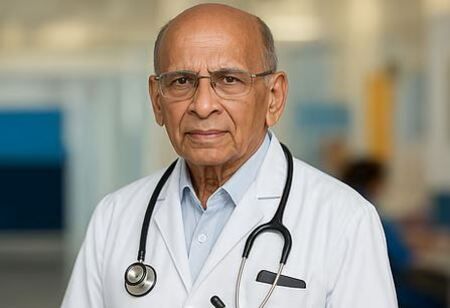
This Healthcare Leader Serviced the Poor for Just Rs.2


Dr. A.K. Rairu Gopal, fondly known as the “Two Rupee Doctor,” passed away at the age of 80 in Kannur due to health complications related to aging. His funeral was held on August 3 at Payyambalam. He was well-known for his lifelong dedication to medicine, having treated over 1.8 million patients with a very low consultation fee of Rs.2 for the majority of his career.
The esteemed doctor conducted his practice from his home near Thaan Manikkakavu temple in Kannur, beginning to see patients as early as 3:00 a.m. to suit the needs of daily wage earners and students. His routine commenced as early as 2:15 a.m., during which he would clean his cowshed and distribute milk, engage in prayer, and read the newspaper before starting his medical consultations.
For more than half a century, Dr. Gopal provided affordable healthcare to the community, only increasing his fees to Rs.40 or Rs.50 in his later years. His patients included daily wage laborers, students, and senior citizens, many of whom would queue up before sunrise. He was known for prescribing only inexpensive medications and consistently declined gifts or perks from pharmaceutical companies. His wife, Dr. Shakuntala, along with a clinic assistant, supported him in his practice.
Also Read: From Rural to Global: Story of 5 Successful Indian Entrepreneurs
Roots and Early Values
Dr. Rairu Gopal, born in 1945 in Kannur, was the child of Dr. A. Gopalan Nambiar, a well-respected physician who imparted the values of prioritizing service over financial gain. His father’s fundamental belief, “If it’s about making money, consider another profession,” was a conviction that Dr. Gopal adhered to throughout his lifetime. Raised in a family dedicated to charitable medical work, he recognized early on the significance of providing accessible healthcare.
Following in this tradition, Dr. Gopal became a physician with the intention of assisting those in need rather than accumulating wealth, upholding a legacy of compassion and commitment.
A Daily Routine of Endless Service
Dr. Gopal’s daily life was characterized by rigor and an unwavering commitment to his patients’ wellbeing. He woke up at 2:15 a.m. to care for his cows before opening his clinic close to the Thaan Manikkakavu temple by 6:30 a.m. Being aware of the schedules of workers and students, he would often start seeing patients as early as 3:00 a.m., frequently attending to more than 300 individuals in a single day.
Also Read: Nitin Gadkari: Becoming the Highwayman of India
His wife, Dr. Shakuntala, who is also a doctor, supported him along with aides who helped manage the large number of people who came to see him. Even as his health deteriorated in later years, his commitment remained unwavering, and thousands continued to seek out his medical care.
In a time when healthcare was becoming increasingly commercialized, Dr. Gopal distinguished himself by sticking firmly to his principles. He turned down offers from pharmaceutical companies and avoided expensive medications, choosing instead to recommend affordable and effective treatments.
This philosophy was in line with his conviction that “healing is a service, not a business.” His straightforward yet impactful guiding principle brought him recognition, including the Indian Medical Association’s accolade for Kerala’s best family doctor in 2013. However, the true indicator of his achievement was the appreciation from countless patients who regarded him as not just a physician but a friend and protector of their health.
His Healthcare Model - Grounded With Compassion and Accessibility
The passing of Dr. Gopal on August 2, 2025, elicited a wave of sorrow from the Kannur community and far beyond. He left behind a lineage of medical professionals, including his spouse and children, who continue to uphold his principles. More than just a healthcare provider, Dr. Gopal embodied empathy, humility, and a commitment to service.
His narrative underscores the significant effect of a healthcare model grounded in compassion and accessibility. In a time when medical services are frequently a luxury for those with financial means, his legacy serves as a reminder to reconsider our values and embrace the transformative power of kindness in the medical field.
A Lifetime Commitment to Affordable and Ethical Medical Services
Dr. A.K. Rairu Gopal’s legacy serves as a powerful reminder against the increasing corporatization of healthcare. His steadfast commitment to providing affordable and ethical medical services emphasizes that healthcare should be considered a fundamental right available to everyone, rather than a mere commercial exchange.
Even in his later age and when declining health began to impact Dr. Gopal's physical abilities, his devotion to patient care never faltered. Although his health issues resulted in a reduced number of patients he could attend to each day, his commitment to delivering quality and affordable healthcare remained unwavering until his final days.
This resolve in the midst of personal health struggles highlighted the depth of Dr. Gopal's dedication to his patients and his belief in medicine as a sacred responsibility between the practitioner and the community. His ongoing service, despite his physical limitations, stood as a remarkable example of professional commitment that went beyond personal comfort or ease.
His life urges us to contemplate the wider social obligations of healthcare professionals and policymakers in delivering fair access to care. His story prompts medical professionals, healthcare organizations, and policymakers to rethink the equilibrium between sustainability in their careers and their duty to the community. Although it's not feasible for every practitioner to emulate Dr. Gopal's specific approach, his methodology provides essential insights into the importance of creativity, empathy, and dedication in delivering healthcare.
The countless lives influenced by Dr. Gopal's dedication signify more than just numbers; they represent a community transformed by one person's resolve to advocate for healthcare as a fundamental right instead of a luxury. His legacy continues to raise important questions about the potential of healthcare when practitioners choose healing over profit and service over self-interest.